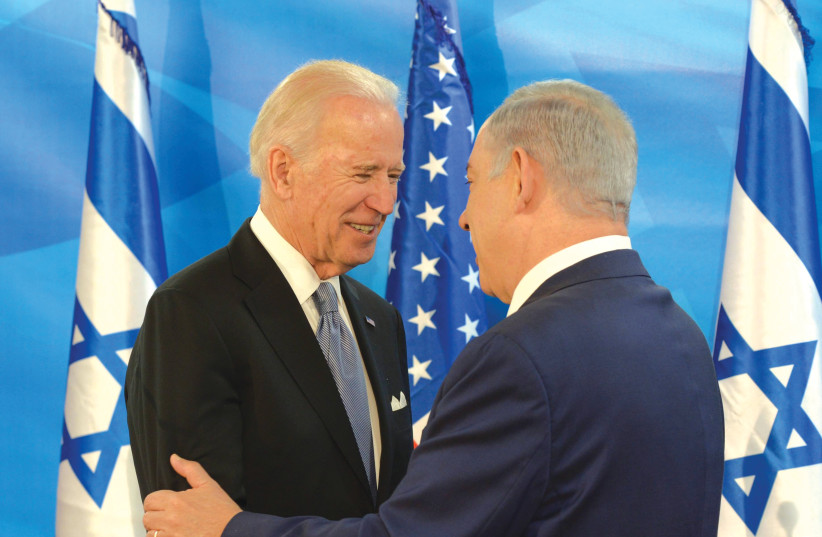Judging from some of the overheated reactions to comments US Secretary of State Antony Blinken made Monday regarding the government’s judicial reform plan, one might surmise that he said that either Israel dumps the program or loses American support.
For instance, National Missions Minister Orit Struck (Religious Zionist Party) tweeted: “Dear Mr. Blinken, I understand that you decided to give our prime minister a lesson in democracy. Well, democracy is, first of all the duty of a country to determine its course according to the votes of its citizens, with each ballot given equal weight, without foreign involvement. And demonstrations, as legitimate as they are, are not the same as a ballot.”
She expanded in an interview on Kan Bet, saying, “this interference in an internal Israeli debate does not respect our sovereignty.”
On the other side of the spectrum was former Labor minister Nachman Shai who tweeted, “Secretary of State Blinken gave a basic lesson in democracy yesterday to the Israeli government and the prime minister. The Americans avoid confrontation, certainly with friends. They have their own ways. These clear and decisive statements show that we will lose America on the way to a ‘regime coup’.”
But what did Blinken say?

Judicial reforms vs. the US-Israel relationship
The 75-year relationship between the two countries, he said, is rooted in shared interests and shared values, including “our support for core democratic principles and institutions.” Then in the evening, alongside President Isaac Herzog, he added that he appreciated the “clarity” of Herzog’s voice “when it comes to finding a good way forward that builds consensus on the question of judicial reform.”
That’s it.
Even assuming that what Blinken said in private to Netanyahu about the reform was undoubtedly sharper than what he said in public, is this really delivering a “basic lesson in democracy,” as Shai claimed, or an infringement on Israel’s sovereignty, as Struck would have one believe?
First, regarding Israel’s sovereignty and independence.
No country wants another country to come in and tell it how to run its internal affairs (witness the lingering anger in the Democratic party over Netanyahu’s speech to Congress in 2015 against the Iranian nuclear deal). Nor does any country want another to come in and try to determine its policies.
But, what can you do, it happens all the time. Countries – especially those with military and economic clout – are constantly telling other nations what they think they should do and how they should act. Besides, the US is not just any country, it remains the most powerful in the world, and its relationship with Israel is not the same as with other countries around the globe.
The US-Israel relationship is, indeed, a special relationship. The US defends Israel in international fora, provides it with $4 billion annually in military aid, and comes to its assistance in innumerable ways time and time again.
The relationship, however, is not a one-way street as it may have been in the past. Israel provides the US with a steady, reliable strategic asset and partner in a key but volatile part of the world, supplying it with invaluable
intelligence and security cooperation that is important for America’s national security.
Still, Israel is the junior partner in the relationship. What that means is that the senior partner, every once in a while, will come in and try to tell the junior partner what to do. Though this may seem, as Struck said, an affront to the country’s sovereignty, it really isn’t. Israel is a free and independent country and can decide, if it wants, to ignore that advice.
Yet it should do so knowing that a decision to ignore the advice may have consequences. Israel might decide that the consequences are worth the price, or it might decide that what it gains by the policies it wants to pursue is not worth what it might lose in terms of its relationship with the US if it follows those policies.
We’ve been down this road before, most recently in the early months of President Barack Obama’s presidency in 2009, when he pushed Netanyahu hard on the settlement issue. Obama’s “tough love” policy at the time was animated by the assumption – long popular among some Israeli pundits and opposition leaders – that the Israeli public would never tolerate a confrontation with a US president, and if it came to that, the public would rally around the US president, rather than their prime minister, so as not to risk the vital US-Israel relationship.
But reality proved different. Confrontation with Obama over the settlement issue – and later over Iran – did not weaken, but rather strengthened, Netanyahu’s public support.
Blinken could be making a similar assumption: that if the public is forced to choose between judicial reform or the current closeness of the relations with the US, it will choose the latter. That, obviously, is what he heard from the civil society representatives hand-picked by the embassy for him to meet on Tuesday.

